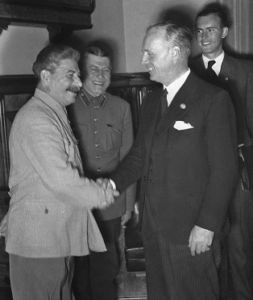
Joseph Stalin and Joachim von Ribbentrop during the signing of the German-Soviet Non-Aggression Pact on August 23, 1939.
1,852 words
Part 3 of 5 (Part 1 here, Part 2 here, Part 4 here)
By August 1939, everyone understood that a war between Germany and Poland was extremely probable. The great question was whether it might still be prevented from developing into a general European war. Hitler was under an important time constraint: since October rains transform Poland into a sea of mud, German military leaders warned him it would be unsafe to postpone the launch of hostilities past September 1.
On August 12, a Soviet chargé d’affaires called at the German Foreign Office to announce that Stalin wished to arrive at an understanding with Germany about Poland and Russo-German relations. Dilatory diplomatic contacts continued for over a week until, on the 21st, Hitler dispatched a personal telegram to Stalin requesting that Foreign Minister Ribbentrop be received in Moscow within two days. Stalin duly invited him for August 23.
Hitler’s coming triumph in obtaining a Soviet agreement was undercut on August 18 by an Italian diplomatic blunder: Foreign Minister Galeazzo Ciano told the British Ambassador that Italy “has not agreed” to support Germany in the event of war. This is what most observers had taken the May Pact of Steel to imply. When Halifax received word of Ciano’s statement, he hastened to inform British diplomatic missions abroad that Italian defection from the alliance with Germany was a certainty. For extra assurance, he dispatched a message to Rome two days later warning that Britain would attack Italy immediately with most of her armed forces if she joined Germany as an ally in any future war.
The effect of Ciano’s remark on France was more decisive still. Indeed, Hoggan believes “it is reasonably certain that France, and consequently Great Britain, would not have attacked Germany” had it not been for Ciano’s indiscretion. At a French Defense Council meeting the previous March, the Commander-in-Chief of France’s armed forces, Gen. Maurice Gamelin, had confessed that the country was unprepared for a conflict with Germany. At the next such meeting, on August 23, he said France’s military position had improved. According to Hoggan, the only conceivable excuse he could have had for saying this was the new assurance of Italian neutrality.
By mid-August, Polish authorities were proceeding to mass arrests of their German minority. On the 16th, they incarcerated the most prominent German leader in Poland on espionage charges, but he was released following British intervention. He proceeded to Danzig, where he met with German authorities on the 22nd:
[He] spoke of a disaster “of inconceivable magnitude” since the early months of 1939. The last Germans had been dismissed from their jobs without benefit of unemployment relief, and hunger and privation were stamped on [their] faces. German welfare agencies, cooperatives, and trade associations had been destroyed. The mass arrests, deportations, mutilations, and beatings of the past few weeks surpassed anything which had happened before.
By this point, Polish authorities were responding to criticism of their actions with sweeping charges of German mistreatment of their own Polish minority. But such charges remained entirely general, whereas German press reports of anti-German actions in Poland included names, dates, and details. Polish diplomats in Berlin admitted privately that the lack of detail in Polish accusations was due to the difficulty of finding specific incidents.
Despite Britain’s March 31 guarantee to Poland, Hitler had long found it difficult to believe that, when push came to shove, the British leadership would plunge the entire European continent into a war over Danzig. He hoped the approaching conflict might be limited to Germany and Poland. He was strengthened in this hope by reports he received from the German Foreign Office on August 16. One, originating with a friendly French journalist, rested on what Hoggan calls “the obvious fact that Great Britain would not attack Germany without French support,” combined with French Foreign Minister Bonnet’s determination not to allow France to be drawn into a war on behalf of Poland. A second was based on claims of “lively opposition to war with Germany within the British Air Ministry.” This report’s source conceded that both Britain and France might declare war, but would subsequently be willing to conclude peace following the Polish phase of hostilities.
Accordingly, on the evening of August 22, Hitler told German military leaders he was convinced that Britain would not actually attack Germany. Britain, he said, “had no need to wage war and consequently would not wage war.” Hoggan observes that Hitler “attributed a far more rational basis to British policy than the facts warranted.”
At this same conference, Hitler ordered plans for “Operation White,” military action against Poland, to be completed by the 26th. He refrained from issuing the final attack order.
The next day, August 23, the “Molotov-Ribbentrop Non-Aggression Pact” was signed in Moscow. Contrary to popular belief, this agreement was not an alliance, but a mere delimitation of German and Russian spheres of interest. In effect, the two powers drew a line through the map of Eastern Europe, agreeing that Germany would not interfere with Russian actions to the east of it, while Russia would not interfere with German actions to the west. Much of Poland lay east of the line, at the mercy of the Bolsheviks.
Hitler hoped the new pact would cause British leaders to realize the impossible situation their Polish ally was in, and seek a compromise to spare her inevitable disaster. They would surely have done so had they given a damn about Poland, but in fact they were sacrificing Poland to reach their true objective of war with Germany. The same day the German-Soviet agreement was signed in Moscow, the British ambassador delivered to Hitler a letter from Prime Minister Chamberlain. It warned that Britain would support Poland with military force regardless of the new pact. Chamberlain conceded that Germany might well subdue Poland, but added that Britain would fight on regardless.

You can buy Alain de Benoist’s Ernst Jünger between the Gods and the Titans here.
Even this letter did not disabuse Hitler entirely of his hopes of making the British see reason. His reply that same day emphasized the suffering of Germans in Poland, and pleaded with Britain’s leadership to consider the situation from the standpoint of humanity rather than abstract considerations of policy. He blamed Polish intransigence on Britain’s guarantee, and closed with the observation that war would mean the defeat of his lifelong ambition to promote Anglo-German friendship and understanding.
On the night of August 24, on Hitler’s orders, Ribbentrop telephoned Ciano to request a definite statement of Italian intentions. Ciano replied that Germany would receive it the next day.
August 25 was a busy day for Hitler. By early afternoon, he received his answer from Italy. The prospect of a frank repudiation of the German alliance proved unbearable to the Duce, so Ciano instead persuaded him to send the Germans a formal offer of support conditional upon Germany supplying Italy with impossibly large quantities of raw materials within an absurdly short time. Hitler received the telegram by early afternoon and immediately understood that it represented a refusal.
At 1:30 PM the British ambassador arrived to receive formal German proposals for an Anglo-German agreement. Germany wished, he explained, to follow up her treaty with Russia by concluding a treaty of friendship with Britain:
He was prepared to assume the greatest and most complex commitment on behalf of Great Britain that had ever been offered by any foreign leader. This commitment was no less than to place the entire power of the Reich at the disposal of the British for the defense of the British Empire at any point and any time. The British leaders themselves, of course, would be free to decide in any threatening situation when and if they needed this aid. Hitler believed that an arrangement of Anglo-German differences would create conditions of complete security for both Powers, and it was obvious that a drastic reduction of armaments would be immediately feasible. . . . The very last thing he could possibly desire was to turn Germany into nothing better than a military barracks.
The British ambassador relayed this offer to Halifax with the recommendation that Hitler be given an opportunity to demonstrate his good intentions.
Immediately following this meeting, Hitler gave the order to begin full-scale military operations against Poland the next morning at dawn. He hoped to minimize the danger of a wider conflict by settling accounts with the Poles while the impact of his alliance offer was fresh, and before Britain and France learned that Italy would not support him (not realizing they had learned this several days before he did).
Shortly before 3:00 PM, Polish telephone communications through Germany were interrupted by the military authorities. Beck interpreted this as part of a war of nerves rather than an indication that an attack was imminent, and Poland did not order full mobilization. By 3:05 PM, General Wilhelm Keitel had distributed all the necessary orders to the individual German army commanders. The German war machine was in motion.
Hitler anxiously awaited news from Britain. When it arrived at 5:00 PM, it was not what he anticipated. The German News Bureau announced that the British guarantee to Poland was about to be formalized as an Anglo-Polish alliance. Hitler’s optimism that Britain would avoid full-scale war on Poland’s behalf was finally starting to be shaken.
At 5:30 PM, the French ambassador arrived for a previously scheduled meeting. In the ensuing conversation (and possibly unaware Bonnet was opposed to intervention) he gave Hitler his “word of honor as a soldier that he had no doubt whatever that in the event of Poland’s being attacked, France would assist her with all the forces at her command.” Hitler’s confidence in the step he had taken was further shaken.
After this meeting, he summoned Ribbentrop:
Hitler complained that he had received two very bad pieces of news on this one difficult day. One was the defection of Italy, and the other was the conclusion of the Anglo-Polish Pact. Hitler was astonished that these two developments occurred in the wake of his treaty with the Soviet Union. He was sufficiently flexible to agree with Ribbentrop that his analysis of the Anglo-French position was probably wrong.
If so, his assumption that Poland could be fought without plunging the whole of Europe into war was also wrong. Although the attack order had already gone out, it was not yet irrevocable. Such a last-minute reversal was one of the hypothetical scenarios for which the German military had planned. The point of no return would not be reached until 9:30 that evening. Even so, plenty of confusion and failures of communication were possible in the event of a cancellation. As Hoggan observes, “the Bulgarians had stumbled into the Second Balkan War under similar circumstances in 1913, and suffered a crushing defeat.” Hitler faced an agonizing decision.
Mindful that his alliance offer to Britain might still have an effect, he summoned Gen. Keitel, and at 6:30 PM he ordered the attack on Poland suspended. Keitel instantly sent out the command that “the already started ‘Operation White’ will be stopped at 20:30 (8:30 PM) because of changed political conditions.” There were a few serious slips, but the Wehrmacht was more efficient than the Bulgarian army of 1913. Germany was pulled back from the brink.
Found at https://counter-currents.com/2023/12/hitler-the-peacemaker-part-3/
Leave a comment